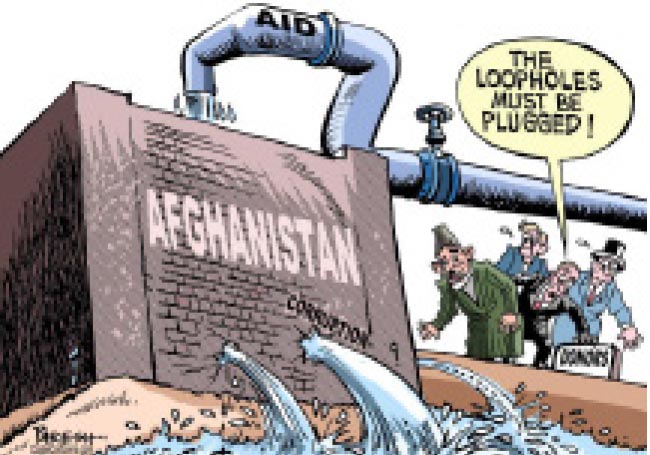The strong campaign against the administrative corruption by the National Unity Government (NUG) yet to come to fruition. Following his victory in the presidential election, Ashraf Ghani called the judicial system corrupt. He revealed a strong sense of concern in this respect stating that the involvement of judicial system in corruption was beyond tolerance and declared a deadline. During its first working days, Ghani’s administration took high steps in fighting corruption and Mafia. The Kabul Bank case was the most perilous and significant issue in counter-corruption and issued decree for pursuing the case. This issue was as critical as the level of Mafia’s economic power.
The President’s strong determination in fighting corruption and Mafia deserved appreciation, but the gleam of hope did not last long for Afghan people.
In fact, in the critical time of fighting corruption and Mafia in Afghanistan, reliable administrations and serious determinations have not only been defeated but also disguised. The anti-corruption administrations in former governments, which ushered in fighting this issue initially, succumbed to corruption.
Within thirteen years of chanting slogan against corruption, the former government found itself involved in it. The previous administration will never be forgiven by the public conscience for negligence in fighting corruption. The history will keep its submission to corruption and corrupt individuals.
The culture of tribute and violence, which has transferred from politics to administration, is believed to be the strong source of administrative corruption in Afghanistan. Within three decades of political campaigns, the politicians gained their objectives through violence. Legalizing violence is the very political bribery – which has been widely exploited by authorities in Afghanistan. Hamid Karzai’s administration could convince the political dissidents in the same manner as he bestowed large concession to political figures.
From the distant past, parallel posts and positions in the government’s structure was created on the basis of political bribery. The spirit of taking political bribery has been deeply imbedded in many politicians and cannot be removed easily. Following the years of conflict in Afghanistan, a large number of those involved in this conflict switched from battle to administrative organization, this will be the main reason behind corruption.
Lack of administrative ability in administrations will exhaust the clients in the country’s administrations and will pave the ground for violence. Structural violence has been institutionalized in the same way. If this trend continues, people will be forced to pay tribute. This is how bribery has been imposed on the faithful people of Afghanistan.
In the post-conflict Afghanistan, Mafia’s elements have been attracted to the administrative structure of country via political reconciliation. These individuals went beyond taking bribery and sought to create or deal with Mafia’s organizations in the country. The huge and extensive corruption in the higher level of the government’s administration has originated from the very source. Hence, governmental administrative staff will be the main cause of corruption. Corruption in the government’s body is like a widespread virus in the public air. There should be strong determination for combating corruption. In short, the high-ranking officials will have to show determination in this regard. Otherwise, this trend will continue unabated.
A tight control and serious supervision are believed to reduce corruption. This control includes judicial one that will have to prosecute perpetrators. However, corruption has been highly rife in Afghanistan and harmed the judicial system. That is why perilous criminals are easily released from country’s prions or exonerated in courts.
Although the NUG inserted fighting corruption on the top of its agenda, this struggle was hampered technically. Since Afghanistan’s administrations were deeply engaged in corruption, no government would be able to remove the corrupt from the state’s structure overnight. The struggles of the NUG to fight corruption have remained in a nascent level. Administrative corruption has penetrated in the state’s deep layer and its root has grown stronger. So, corruption will not be removed through superficial reforms and its root will grow again, in case of being campaigned superficially.
The government determination in fighting corruption will be fruitful only if there is a clear mechanism. In other words, the possibility of administrative corruption exist all around the world, but will be prevented by effective mechanism.
The NUG’s decision in adopting effective mechanism about fighting corruption deserves appreciation, but it is not enough.
Necessary reforms in procurement and contracts, supervision and control over the offices, establishing high council in implementing the rule of law and founding anti-corruption judicial center are the important measures adopted by the NUG. But they are not impenetrable filters. The members of Mafia will easily find out the way to escape the filters. Reforming policy and law, improving administrative reform, creating a transparent mechanism for financial management and reforming the judicial system need to be done by the government. Afghanistan will not get the international aid in case of no reduction in administrative corruption. Subsequently, the government will raise domestic tax, which will be backbreaking for both state and nation.
Home » Opinion » NUG – In the Ordeal of Fighting Corruption
NUG – In the Ordeal of Fighting Corruption
| Syed Asif Husaini

